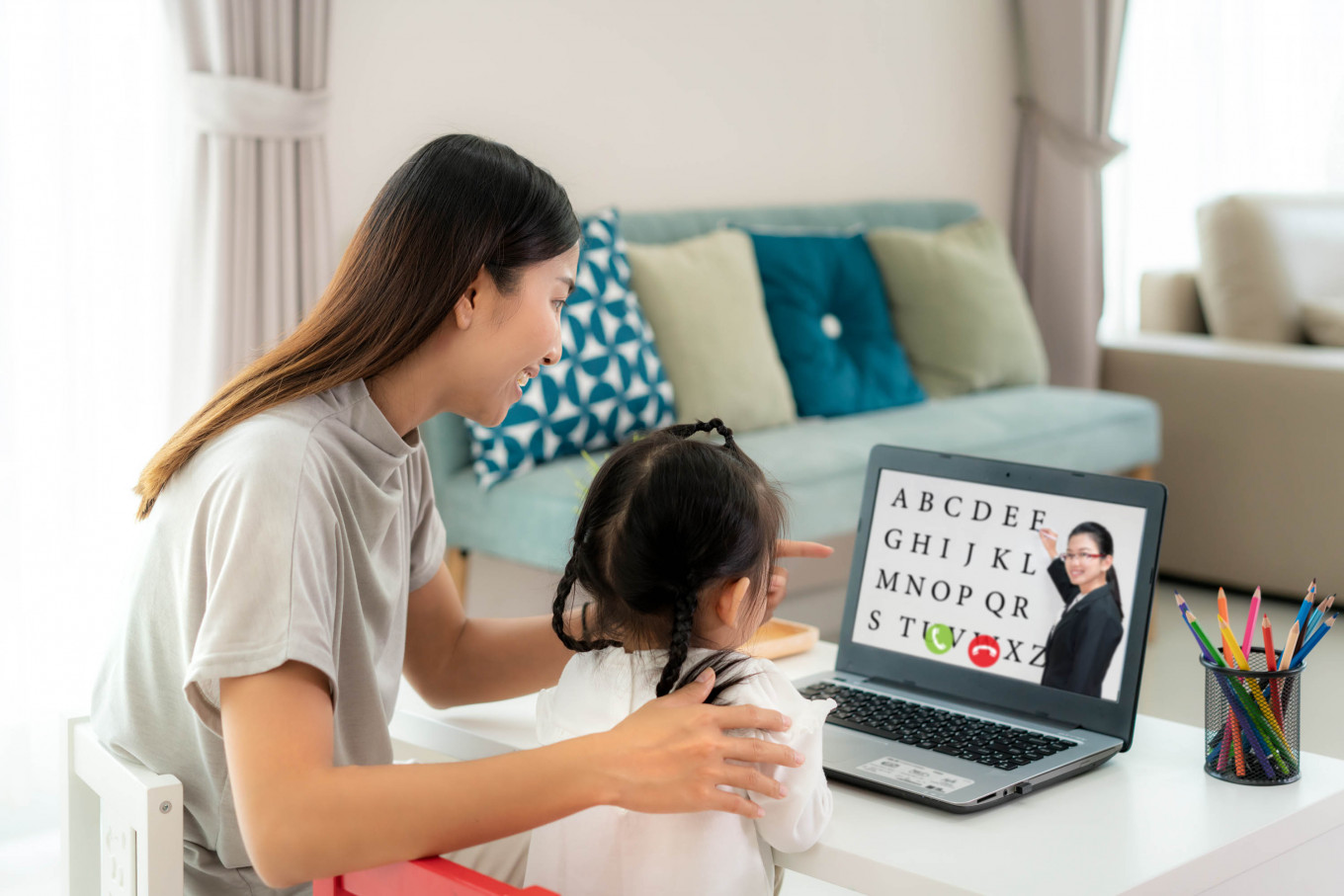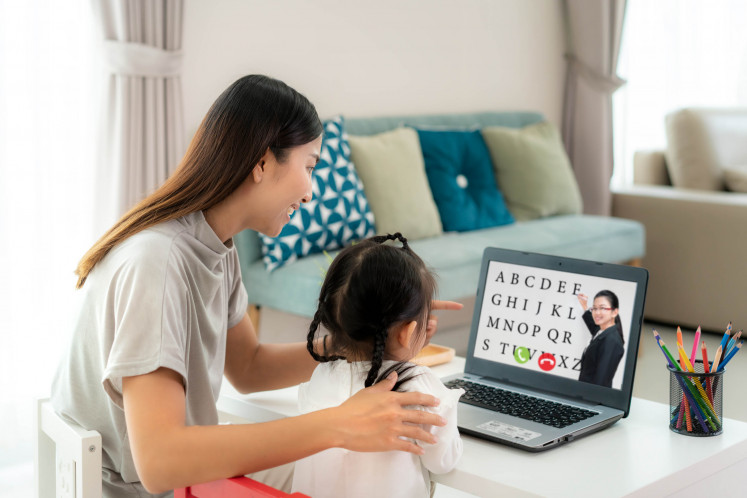Popular Reads
Top Results
Can't find what you're looking for?
View all search resultsPopular Reads
Top Results
Can't find what you're looking for?
View all search resultsBoosting children’s social skills during home quarantine
Change text size
Gift Premium Articles
to Anyone
A
s a result of the home quarantine during the COVID-19 pandemic, children have to attend their classes online and they can no longer enjoy their playtime or outdoor social activities because of physical distancing and large-scale social restrictions.
Within this context, it is understandable that a lot of educators and parents alike have started to worry that their children’s social-skill development might be impaired within the confines of the virtual activities and home quarantine at a critical period when these young ones should be developing and achieving their social-development milestones.
Yes, the current situation is not ideal for child development but we need not be all that pessimistic. Many educational experts have pointed out how teachers and parents can work together to inculcate social smarts in their children, even within the limitations imposed by the coronavirus.
Multimedia Nusantara University lecturer Doni Koesoema, who focuses on character-building issues in education, recently said that with a little bit of imagination, teachers could actually incorporate social dimensions in any teaching materials, even when they are teaching mathematics.
“Say you are teaching addition to elementary school students. You can actually assign them to add up the total numbers of the ages of all their family members. This will require them to actually engage in a conversation with their family members to ask them how old each of them is,” Doni said.
Teachers will find this incorporation easier when they are teaching humanities subjects, according to Doni.
“For instance, instead of asking your children to list down the procedures of a particular religious ritual, the answers to which they can easily browse online to copy and paste into their worksheets, ask them instead to elaborate on their social and spiritual experiences while conducting these religious rituals with their family members, for instance,” he illustrated.
“This way, you can prevent children from cheating and you can engage them in a dialogue about the social dimensions of their rituals,” he continued.
Doni said that teachers could also ask children to imagine being in another person’s shoes to instill empathy.
“You can illustrate a story of a classmate who’s in trouble, for instance, and ask them to solve this classmate’s problem,” he said.
The Sampoerna Academy has blended various methods, including discussions and problem-solving activities through case studies, as well as activities in the arts, which the academy refers to as ingredients for “successful virtual schooling”.
Combining these various methods is necessary, according to Doni, not only to keep boredom at bay while students spend more time at home but also to help children grow their social skills.
Within the COVID-19 context, Doni said teachers could also ask students to come up with ideas about what they could do to help others during the coronavirus outbreak and, if possible, create projects where they can actually translate those ideas into action.
Various schools applying the International Baccalaureate (IB) curriculum have in fact integrated this service-in-action element in their teaching activities. For instance, students from some of these schools have come up with an idea to sew face masks to help circumvent the low supply of such equipment among underprivileged people.
Turning this project into reality, whereby these students actually sew face masks from home to distribute them to those in need, has been a vital part of IB curriculum learning.
Teachers and schools cannot work alone in educating children, especially in these tough times. Keeping in close communication with parents is important, both Doni and clinical child psychologist Kantiana Taslim agree.
Doni said that in order to do this effectively, teachers needed to really assess a student’s family situation.
“Don’t assume that they come from the typical ‘ideal’ nuclear family formation, with both mother and father present. A lot of teachers make this mistaken assumption, telling a student to ask her father a question when in fact the father has already abandoned her post-divorce or has passed away, for instance,” he said.
“Take into consideration that your students might be brought up by single parents or maybe even their grandparents. You can modify the family-related assignments you give your students based on each student’s unique family configuration,” he added.
Within the domain of the parents’ role, Kantiana said that parents could also spend time to help their children become aware of their emotions and how to cope with these emotions.
These emotional skills, according to Kantiana, were often overlooked as many times people relied too much on social interactions to boost social skills. In truth, Kantiana said, there was no way for children to develop empathy and care toward other people when they could not even understand what they were feeling and how to cope with such feelings.
“Start with the basics. When your children cry, help them investigate, whether they cry out of hunger, boredom, sadness or frustration? Then dig deeper: what frustrates them? How can they deal with their own frustration? By getting to know these things, they can start to empathize with what other people are going through,” Kantiana advised.
Kantiana went on to say that this lack of emotional awareness and adequate coping skills often caused children to show behavioral problems, including aggression, in social settings.
“For instance, when your children throw temper tantrums or make other children cry by pinching them violently, or hit other children, there are usually some unaddressed core emotional problems lying beneath the behavior we see on the surface,” she added.
Parents have an advantage in this realm since they can spend more intimate one-to-one sessions with their children, as opposed to teachers who have to attend to classical formations of classrooms, thus having to deal with 30 or more children simultaneously, according to Doni.
“Before they can start doing this, of course, families also have to be honest and compassionate in addressing problems that happen internally with some of their members. A lot of time, children exhibit aggressive tendencies, such as wanting to hit other children or spew obscenities at other people, because they observe certain family members indulging in these behaviors,” Doni continued.
Then, of course, practice makes perfect.
Homework to boost social skills: To help children boost their social skills while learning at home, teachers can come up with various types of homework that require students to interact with family members at home. (Shutterstock/Travelerpix)Fortunately, despite the COVID-19 pandemic, some parents can still allow their children to play with friends and relatives – while observing all the health protocols such as washing one’s hands on cue, wearing face masks and taking baths as soon as they return home again – because they are lucky enough to live in the same neighborhood.
Novelist Ratih Kumala, 40, often takes her 9-year-old daughter Kinan to her in-laws’ house, located in the same housing complex, so that Kinan can spend time playing with her two cousins, aged 5 and 6.
“My daughter often lamented that she missed going to school. I figured she missed playing with her friends. So, I will just allow her to walk to our in-laws’ house to play with her cousins about five times a week. They will engage in role playing, taking turns to play teachers and students to reenact how their teachers are teaching them at school,” Ratih said.
Kantiana said that this imaginative role playing was also great in helping children achieve their social-development milestones.
The psychologist went on to say that even if parents did not have any relatives living nearby, they could still help their children interact with other family members using virtual platforms such as video calls or Zoom.
She added that it was also important that parents conducted daily briefings to help these little ones make sense of their social and emotional lives to strengthen their socioemotional skills.
Considering how busy parents are with the heavy demands of contemporary urban life, these daily sessions need not be too long; it is the consistency that counts, according to Kantiana.
“It is better to have 30-minute sessions with your children every day, dividing these into two 15-minute sessions at breakfast and after dinner, for instance, rather than having two-hour sessions but only once a week,” Kantiana said.
In these sessions, parents can have dialogues with their children on the socioemotional problems that they are having and how to solve them.
“Consistency helps reassure children that they always have someone to turn to in times of difficulty,” she said.
Yet, again, do not beat yourself up when you cannot seem to probe your children’s problem or inspire the behavioral change you want to see in them right away, according to Kantiana.
“Just be patient with the process and let go of perfection, especially in these tough times. Parenting is an art, not a science,” she advised.











